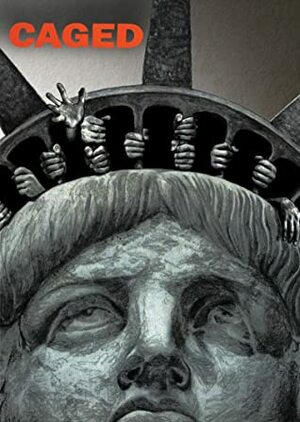I didn’t intentionally set about to read Caged for Black History Month, but I suppose that’s kind of what happened.

I read it in two sittings over the course of a single weekend. The play is distilled from scenes and dialogue written by 28 members of a literature course at a maximum-security prison in Newark, New Jersey. They then sifted through that material and refined it, working together to bring to the fore the story and struggles of protagonist Omar Moore, trying to protect his little brother Quan and provide for his son Zaire, until he gets put away for 17 years for a crime he didn’t commit.
The thing that comes to mind while organizing my thoughts about this was the small dust-up eight years ago over Cuts Through Bone, an award-winning new detective novel that caused a minor dust-up over the fact that the author, Alaric Hunt, was incarcerated, serving a life sentence for murder—in a bid to distract the police from a jewelry robbery, he set a fire that took the life of a young grad student.
Another thing that comes to mind is Annie Dookhan, the lab tech who falsified untold mountains of evidence in drug cases. The astonishing thing in all of that is the sheer volume of her fraud—how many lives have gone down a similar track as the New Jersey Prison Collective, or Omar, or any of the other characters in Caged, because of her actions?
And the final thing that comes to mind is the absolutely worthless hew and cry being raised over the ludicrous idea that people want to censor Joe Rogan. Here’s the thing: Joe Rogan gets to be a media figure and have a show and be a “voice” in “the conversation.” Even if Spotify took him off their platform he’d turn up somewhere else, like a bad fucking penny, and we’d still be stuck talking about him. He’d get to live his life as a free man (how much weed has he smoked in his life that was up until very recently not legally obtained?) and, I don’t know, write a book or go on speaking tours or whatever else. None of that is censorship.
Contrast that with how we (in the US, anyway) treat and talk about the incarcerated. I’m not trying to imply that there is a conspiracy to keep their voices out of the conversation; my point, rather, is that cultural norms mean there doesn’t have to be a conspiracy. It happens of its own accord. Because most of us operate under a “just world” fallacy and because the lives of middle-class suburban Americans aren’t usually touched by the kinds of crimes, life circumstances, or bad luck that send someone to prison (and when they are, they do their best to hide it), the unexamined belief we carry for most of our lives is “people who commit crimes obviously choose to commit them, so prison is what they deserve, and as a whole they’re a subset of the population that’s not worth thinking about and that doesn’t have anything worth saying.” That’s the most powerful censorship of all—not banning someone’s ideas or burning their books, but structuring society so that everyone else forgets that some 2.2 million Americans even exist.
We’ve always been at war with Oceania.
Caged was a good play. I would love to see it performed because I would love to see the set direction as it’s described in the text. But I think the most important thing about it is how it has found a way around that internalized censor and put the voices of the incarcerated out there for public consumption, to speak directly about their experiences and life in a system that has tried to erase them.

One thought on “Caged”